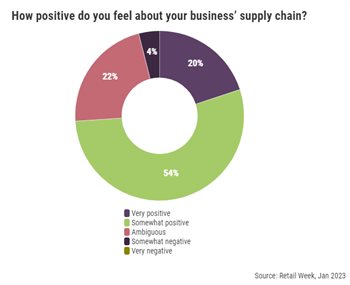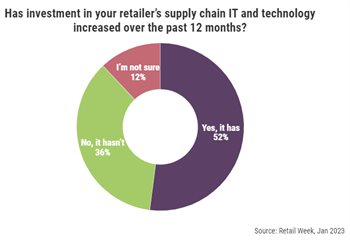Research reveals the power of ERP in effective inventory management
The backbone of South Africa's supply chain management
In the world of manufacturing, the importance of efficient inventory management cannot be stressed enough. With a multitude of challenges such as supplier bottlenecks, fluctuating stock levels, and production schedule adjustments, the need for a holistic approach to manage all these elements is paramount. This is where Manufacturing Enterprise Resource Planning (ERP) systems come into play. Compelling research by Retail Week: Supply Chain 2024 shows how ERP acts as a backbone for modern manufacturers.
Understanding the inventory challenges manufacturers face
1. Supplier bottlenecks
Supplier bottlenecks are disruptions or slowdowns in the supply chain that prevent materials or components from reaching manufacturers on time. This can be due to various reasons ranging from local logistical issues, loadshedding, rising inflation and rising costs, to global supply shortages.
Such bottlenecks often have a cascading effect within the manufacturing business. Supply chain bottlenecks cause inventory issues which leads to significant disturbances in production schedules. This unpredictability not only increases costs but can also affect a company's commitments to its clients, leading to contractual penalties and strained relationships.
2. Bloated stock levels: The cost of overstocking
Having excessive stock might seem like a safe bet for some businesses, anticipating that it would prevent shortages. However, overstocking comes with its own set of challenges.
- Tied-up capital: Money invested in excess stock could have been used elsewhere in the business for growth initiatives or other essential expenditures.
- Increased storage costs: More stock means more space is needed, leading to higher warehouse costs, which could include rent, utilities, and security.
- Risk of obsolescence: Products, especially in industries with rapid technological advancements or seasonal items, risk becoming outdated or irrelevant. Holding onto large quantities increases this risk, leading to potential write-offs.
- Maintenance costs: Products stored for extended periods may require maintenance or even suffer damage, leading to further expenses.
Strategies to combat overstocking
- Implement Just-in-Time (JIT) inventory practices.
- Regularly analyse sales and inventory data to identify slow-moving items.
- Invest in demand forecasting tools within ERP systems to better predict stock needs. Findings show that this approach is the dominant approach to dealing with supply chain challenges, particularly in the EU.
3. Inventory shortages: The dangers of understocking
While bloated stock levels have their pitfalls, running too lean can be equally, if not more, detrimental.
- Missed sales opportunities: Without adequate stock, businesses might miss out on fulfilling customer orders, resulting in lost sales.
- Tarnished brand reputation: Consistently being out of stock can frustrate customers, leading to a damaged reputation and diminished customer loyalty.
- Production delays: For manufacturers, low stock levels of critical components can halt the production line, leading to inefficiencies and increased costs.
- Increased procurement costs: Rush orders to compensate for low stock levels often come with premium prices and expedited shipping costs.
Strategies to prevent understocking
- Establish minimum reorder levels based on historical sales data.
- Build strong relationships with suppliers to ensure quick turnaround when needed.
- Use ERP systems to set up automated reorder points and alerts for low stock. ERP ensures you achieve more accurate stock levels, and have data analytics and real-time inventory visibility.
ERP and MRP: A powerful partnership
What is the difference between MRP and ERP?
At its core, MRP helps manufacturers plan for materials based on forecasted demand. It determines what materials are needed, how much is needed, and when it's needed. By doing so, it aims to keep inventory levels optimal, ensuring a smooth production flow.
While MRP focuses primarily on materials planning, ERP provides a comprehensive solution that encompasses all facets of a business – from procurement to production, sales, finance, and MIS. By integrating various business processes, ERP provides a centralised system to manage them holistically.
For effective inventory management, ERP offers several advantages
- Forecasting: ERP systems leverage historical data to help you plan for future demand. This effective inventory management is more efficient than guesswork, and faster and more accurate than using spreadsheets.
- Economical batches: To take full advantage of the 30 days payment window most suppliers offer, you need to calculate how much you must buy and can produce to sell your offering within those 30 days. This not only ensures your costs are covered before you need to pay for them, it means your cash flow is healthy. Manufacturing ERP gives you that calculation.
- Real-time data: Modern ERP systems offer real-time tracking of inventory levels, sales, returns, and other vital metrics. This aids in making informed decisions promptly.
- Supplier management: By maintaining a database of supplier information and performance metrics, ERP helps businesses choose the best suppliers, negotiate better terms, and manage procurement more effectively.
- So much more: For the true advantage that ERP brings to inventory management, such as automation, visibility, and analytics, talk to your local ERP specialists.
Final thoughts
Inventory management is more than a balancing act; it's a strategic process that directly impacts a company's bottom line and its reputation in the market. Whether grappling with the complexities of bloated inventory and its associated costs or facing the challenges of stockouts and missed opportunities, businesses must remain agile and informed.
Modern ERP systems offer not just a solution but a strategic advantage. It weaves together data, forecasting, and real-time insights. When leveraged effectively, these tools empower businesses to navigate the intricate world of inventory management with precision and confidence.
As we embrace an era where data is gold, the emphasis must remain on its systems integration, quality and accuracy. Only then can businesses truly harness the power of technology to optimise their operations and thrive in a competitive marketplace.
- How a single system helps signage companies 14 Jan 2025
- Business owners, take the break you deserve 2 Dec 2024
- Say goodbye to spreadsheet headaches: Why now is the time to upgrade to an ERP system 6 Nov 2024
- 8 great ways to spring clean your business 4 Oct 2024
- The astonishing benefits of cloud-based ERP 10 Sep 2024
QuickEasy SoftwareComplete business management and ERP software. Rely on QuickEasy BOS ERP to efficiently manage your business's finances, distribution, manufacturing, sales, and people. |

